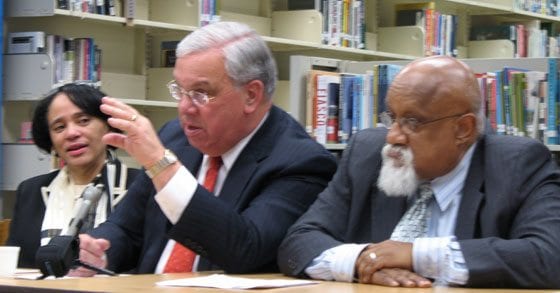
English High School teacher Efrain Toledano has Title VII of the Civil Rights Act of 1964 projected onto the whiteboard of his civics class. With the section of the landmark law that prohibits employment discrimination based on race, color, religion, national origin and sex displayed for all to see, Toledano has asked his students to write about why sexual harassment occurs.
“I wrote about how rapper 50 Cent uses women as sex objects,” says Jonathan Rivera, a senior at the Jamaica Plain school. “Everybody knows sex sells. We buy into it and we believe that’s the way it is.”
The classroom discussion blends themes of civil rights, sexism and pop culture into a lens through which the students view the laws, regulations and legislative bodies that govern life in the United States.
The English High students are working through the first year of a pilot project aimed at introducing a civics class into the Boston Public Schools (BPS). The project, conceived by youth community organizers working at the Hyde Square Task Force (HSTF), grew out of some simple realizations about the ways in which local residents interacted — or didn’t interact — with their government.
“At first, we started noticing that there were a lot of community members complaining that the roads are messed up,” says youth organizer Oscar Brazoban. “People complained, but they never took action.”
It became clear to the youth organizers that many people in their communities didn’t know how to work with government entities to solve problems. The students, who were used to engaging city and state officials about issues such as youth employment, education reform and anti-violence initiatives, decided to work with the city to promote civics education.
Mandatory civics courses were dropped from the BPS curriculum in the early ’70s. While there is a civics curriculum for eighth-graders, HSTF youth organizers argue that city students need a more thorough education in how government works.
The students first presented their plan for a high school civics class at a City Council hearing back in October 2007. City officials were receptive to the plan, agreeing to allow students to participate in the writing of the curriculum of the pilot program, now in its first year of implementation at English High and Madison Park Technical Vocational High School in Roxbury.
“They made a compelling case,” said BPS Superintendent Dr. Carol R. Johnson. “They said the eighth-grade civics education is not enough.”
Last Friday, the youth organizers and several students from the English High class met with Johnson and Mayor Thomas M. Menino to discuss the civics curriculum.
In a roundtable discussion held in the school’s library, students who have been taking the classes discussed the merits of civics education.
“Personally, I liked the class on search and seizure” and the constitutional protections against unreasonable searches by police, said English High senior Paris Massey. “In our community, it’s important for us to know the laws around it. It’s important for students to have this class. It tells you what you need to know about your rights in this community.”
The elected officials present — Menino, state Rep. Jeffrey Sanchez and City Councilors Chuck Turner, John Tobin and John Connolly — expressed support for the civics class.
“It’s very helpful for us to hear from you,” Menino told the students. “I always want young people to be part of the solution.”
Whether the curriculum can be implemented throughout the BPS may depend on how well the school department is able to weather the current fiscal crisis. While Gov. Deval Patrick and leadership in the state Legislature are wrangling with the question of how to fill a budget deficit estimated to be $3.5 billion for fiscal year 2010, Boston’s schools are struggling with the question of how to implement a mid-year cut of 15 percent in their budget for the current ’09 fiscal year.
While it’s unclear whether the civics curriculum can expand system-wide in the immediate future, its approach drew praise from Turner, who said he was impressed with the model of collaborative curriculum-writing used by the HSTF students and the school department.
“Can this model be applied to other areas?” he questioned. “We have a mayor and a school superintendent who are open to innovation.”







